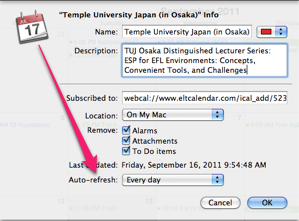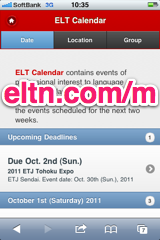West Tokyo JALT:
Teacher Development: Perceptions and Reflections
Date: Sunday, April 27th, 2008 Time: 10:00 AM - 5:30 PM
Speaker: Dr. John Fanselow, Dean Charles, Clair Taylor, Andy Boon
Description:
The West Tokyo Chapter of JALT (the Japan Association for Language Teaching), and Tokyo JALT Chapter announces the seventh in a series of micro-conferences, each featuring several presenters exploring a particular topic for a whole day. The theme of this conference is teacher development through neuro-linguistic processing, action research, reflective practice and transcript analysis.
10:00-10:15: Doors open
10:15-12:15 Dean Charles (British Council) NLP and Teacher Perception. Neuro-linguistic programming is an attitude of mind that can be used to maximise and consistently apply best practice, as human beings in general and as teachers in particular. In this workshop, we will look at the teaching experience through the stages of lesson planning / preparation, being in the learning environment and post-lesson reflection. Applying NLP, we will examine how to develop the teaching skills that we have in these areas and attain the teaching skills that we don't yet have. The workshop will be practical and will supply participants with an NLP 'starter kit' for further research into their own teaching practice.
12:15-13:15 : Lunch
13:15-14:00 Clair Taylor (Toyo Gakuen University) Your Baseline Teaching State. In humanistic approaches to teaching 'state' is central. Your 'state' includes the way you are thinking, feeling, holding your body and breathing at any time. This state can affect your students and their participation and output in your classes. In this presentation, I will summarize the results of an action research project showing how teacher state change led to improved conversational flow in an English Lounge setting. I will invite participants to explore their own baseline teaching state and experiment with a state change activity.
14:15-15:00 Andy Boon (Toyo Gakuen University) On Becoming Reflective. In the act of teaching, we have little time to reflect on the successes, failures or puzzles that occur within our classes, and valuable opportunities for gaining insights into our pedagogic practice can be lost. There is a need, therefore, for practical ways to help us think back, to explore these experiences more deeply, and to discover what is actually happening in our classrooms. This presentation discusses the process of becoming reflective and examines a number of strategies that can be used by teachers to facilitate critical reflection on their teaching and discover new possibilities there.
15:15-17:15 Dr. John Fanselow (Professor Emeritus, Colombia University, Teachers College, U.S.A.) Take 1, Take 2, Take 3. Authors of articles about classroom interaction tend to present one interpretation of the transcripts. When asking a range of ESOL/EFL teachers to interpret transcripts from 3 articles on classroom interaction, no one has interpreted them in the same way the authors did. We should not be surprised that we all see data differently. In this workshop, I will present the 3 transcripts as well as a 3-stage process for moving beyond one-dimensional interpretations. I will invite participants to apply the process to a dialog between a teacher and a supervisor so each person can better understand the 3-stage process and to remind everyone that analyzing transcripts of teacher/supervisor interaction can help facilitate their professional development.
Organization: West Tokyo Chapter of the Japan Association for Language Teaching (West Tokyo JALT)
Cost: JALT Members: free
Non-members: 2000 yen
Venue: Tokyo Keizai University, Daiichi Kenkyuu Center, Room 1310
Location: Tokyo, Tokyo Metropolis, Japan
![]() Add this to iCal
Add this to iCal
![]() (Need help?)
(Need help?)
![]() Add to Outlook
Add to Outlook
![]() (Need help?)
(Need help?)
You can add this event to your iCal calendar.
- Click on the iCal icon. Your iCal software will start.
- Click 'Subscribe':

- Under 'Auto Refresh', select 'Every day' in case the the basic details change:

You can add this event to your Microsoft Outlook calendar.
- Click on the MS Outlook icon.
- See what happens.
- Tell us what happens. I don't have MS Outlook on a Windows computer, so I can't test it.
- If you click on the icon and nothing happens, do this:
- Right-click on the icon and save the file.
- According to Microsoft's support page, in Outlook's File menu, you should click Import and Export.
- Click to select Import an iCalendar or vCalendar file (*.vcs), and then click Next.
- Click to select the vCalendar file you've just saved, and then click Open.
Contact West Tokyo JALT
Website: www.westtokyojalt.com
Email QR Code:






